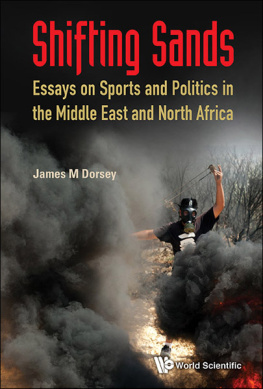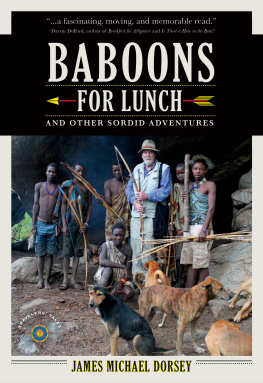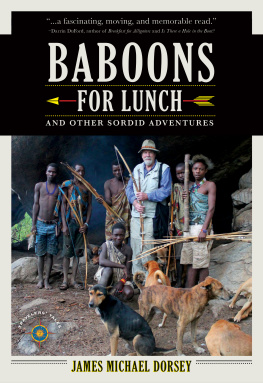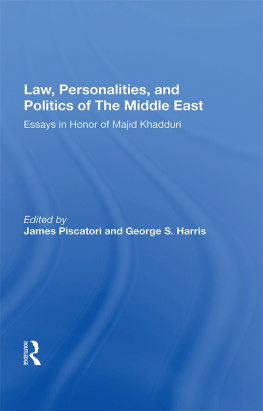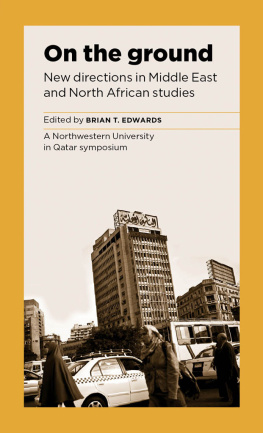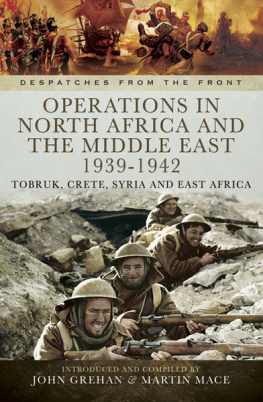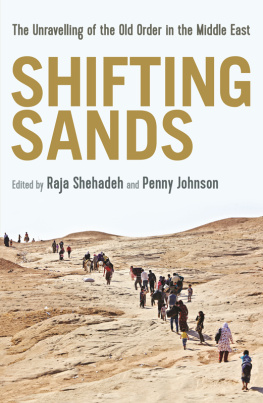Published by
World Scientific Publishing Co. Pte. Ltd.
5 Toh Tuck Link, Singapore 596224
USA office: 27 Warren Street, Suite 401-402, Hackensack, NJ 07601
UK office: 57 Shelton Street, Covent Garden, London WC2H 9HE
Library of Congress Cataloging-in-Publication Data
Names: Dorsey, James M., author.
Title: Shifting sands : Essays on sports and politics in the Middle East and
North Africa / James M. Dorsey.
Description: New Jersey : World Scientific, 2017. |
Includes bibliographical references and index.
Identifiers: LCCN 2017020913 | ISBN 9789814689762
Subjects: LCSH: Sports and state--Middle East. | Sports and state--Africa, North. | Sports--Political aspects--Middle East. | Sports--Political aspects--Africa, North. | Soccer--Political aspects--Middle East. | Soccer--Political aspects--Africa, North.
Classification: LCC GV706.35 .D67 2017 | DDC 306.4/8309174927--dc23
LC record available at https://lccn.loc.gov/2017020913
British Library Cataloguing-in-Publication Data
A catalogue record for this book is available from the British Library.
Copyright 2018 by World Scientific Publishing Co. Pte. Ltd.
All rights reserved. This book, or parts thereof, may not be reproduced in any form or by any means, electronic or mechanical, including photocopying, recording or any information storage and retrieval system now known or to be invented, without written permission from the publisher.
For photocopying of material in this volume, please pay a copying fee through the Copyright Clearance Center, Inc., 222 Rosewood Drive, Danvers, MA 01923, USA. In this case permission to photocopy is not required from the publisher.
Desk Editor: Shreya Gopi
Typeset by Stallion Press
Email:
Printed in Singapore
Introduction Setting the Scene
The soccer pitch is often a reflection of society and an indicator of things to come and no more so than in the Middle East and North Africa where the sport has consistently played an important political and social role for more than a century.
Most recently, militant soccer fans played a key role in the build-up to the toppling of Egyptian President Hosni Mubarak in 2011, the subsequent years of transition, and the protests against the regime of Egyptian General-turned-President Abdel Fattah Al-Sisi, as well as in the protests in 2013 against then Turkish Prime Minister Recep Tayyip Erdogan. Unprecedented criticism of ruling families in Saudi Arabia, Qatar and Jordan occurred in the arena as do ongoing protests against Algerias military autocrats.
For years, many in Middle Eastern and North African autocratic regimes viewed the weekly match as their sole release valve, so much so that Egypt witnessed a sharp increase in its divorce rate because husbands spending on stadium tickets was disrupting household budgets. Conversely, women across the region often see the stadium as an important venue to assert their rights in defiance of conservative clergymen and a traditionally-minded society.
Qatar has led other Gulf states in spending massively on becoming a global sports hub as part of its efforts to increase its diplomatic and economic influence, punch internationally above its weight, and amass the enhances its security, branding and access. In doing so, Qatar has challenged the traditional wisdom that a states ability to project power is at least partly dictated by its size.
Qatars embattled 2022 World Cup has laid down multiple gauntlets for Middle Eastern and North African nations. Qatar is fighting to retain its hosting rights as US and Swiss investigations into corruption in the Fdration Internationale de Football Association (FIFA), the body that governs association soccer, which include credible assertions that it won its World Cup bid through a combination of massive vote buying and backroom political and commercial deals. Qatars woes serve notice to the regions largely corrupt autocratic regimes of the risk of murky, international deal making and abuse of human rights as governments try to project themselves on the international stage. Widespread criticism by human rights and trade union activists as well as FIFA, its corporate sponsors and soccer players and fans of Qatars labour regime that puts the Gulf states majority migrant labour population at the mercy of employers has already put the United Arab Emirates in the firing line with Dubais hosting of the 2020 World Expo and Abu Dhabis high-profile museum projects and hosting of campuses of top Western universities.
The influence of politics on, and the political influence of, the regions soccer is so pervasive that it has shaped teams formed in Europe and elsewhere by Middle Eastern and North African immigrant communities. Sweden has three immigrant teams playing in the countrys highest leagues which are products of the Middle East politics.
All of this persuaded me to delve into the politics of soccer in the Middle East and North Africa by reporting regularly on a blog that quickly won a large following and evolved into a globally published syndicated column. This book is a sum total of that.
It also is the product of more than 40 years of journalistic coverage of the region during which I physically witnessed the regions milestone events as well as more mundane developments. For much of those years, I was based in the region, living in nine different countries, some of them more than once, and having also covered the region from bases in Washington, London, Paris and Amsterdam.
During all those years, I interacted with key players from the region and from outside it as well as people from all walks of life. The network I built and my continuous, almost monthly, visits to the region meant keeping close on-the-ground touch with developments as they happened that kept my insights fresh and up-to-date and allowed me to delve deeper into the political and social history of Middle Eastern and North African soccer. This in turn allowed me to gain access to or renew contact with those old enough to remember events and a history they had often been involved in as well as to relevant newspaper and other archives.
It is to them that I owe an immeasurable debt. Many of them cannot be named or would prefer not to be identified. Yet, without their willingness to share their insights and knowledge this book would have never seen the light of the day. That is equally true for Teresita (Tess) Cruz-Del Rosario, who more than anyone else shaped my thinking with her theoretical knowledge and experience; guided my transition from journalism into academia, even though we would both agree that I keep a foot firmly planted in both; and who has put up with my long hours burning the candle at both ends of the stick and my overbearing travel schedule.
If Tess stands at the beginning and the end of this, it is writer, author and soccer fan Steve Solomon who launched me on my forays into the world of Middle Eastern and North African soccer. Steve unlike me understood the wider significance of the game and planted the idea in my head. Finally, I owe a debt of gratitude to Bilahari Kausikan, one of Singapores most erudite diplomats, for making sure that I retained a base in this remarkable city state as well as Ong Keng Yong, the Executive Deputy Chairman of the S. Rajaratnam School of International Studies (RSIS), Joseph Chinyong Liow, the schools Dean, and Barry Desker, RSISs former Dean, who all ensured that I had an intellectual and professional home that I deeply cherish.


